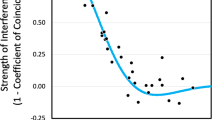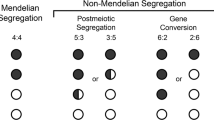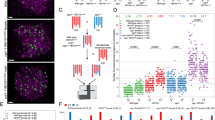Abstract
BRIDGES, Anderson, Mather, Gershenson and many others have shown that there is a definite relation between crossing-over and the disjunction of chromosomes. Their work has made it evident that, during meiosis, crossover chromosomes are distributed between the daughter nuclei more regularly than non-crossover ones. However, the exact nature of this relation is still by no means clear. Darlington thinks that crossing-over is, in general, a necessary condition of regular chromosome disjunction. On the other hand, a number of general considerations as well as some recent facts obtained by Gershenson, Beadle and Sturtevant and Stone and Thomas, are opposed to such an interpretation in the case of Drosophila.
This is a preview of subscription content, access via your institution
Access options
Subscribe to this journal
Receive 51 print issues and online access
$199.00 per year
only $3.90 per issue
Buy this article
- Purchase on Springer Link
- Instant access to full article PDF
Prices may be subject to local taxes which are calculated during checkout
Similar content being viewed by others
Author information
Authors and Affiliations
Rights and permissions
About this article
Cite this article
GERSHENSON, S. Crossing-Over and Chromosome Disjunction. Nature 136, 834–835 (1935). https://doi.org/10.1038/136834a0
Issue Date:
DOI: https://doi.org/10.1038/136834a0
Comments
By submitting a comment you agree to abide by our Terms and Community Guidelines. If you find something abusive or that does not comply with our terms or guidelines please flag it as inappropriate.



